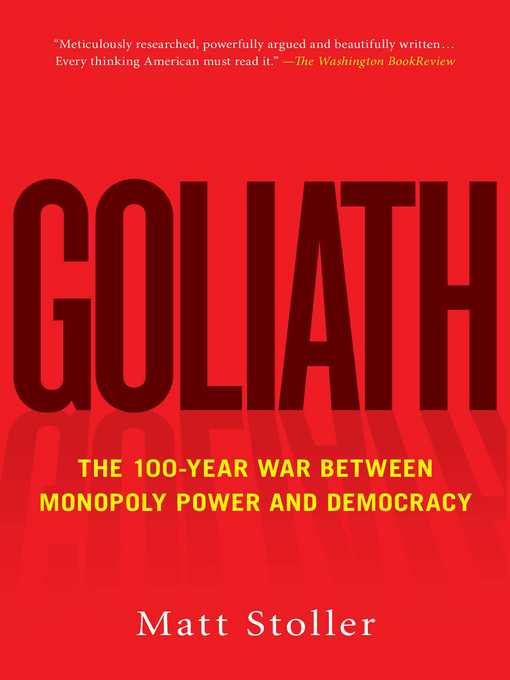
Goliath
The 100-Year War Between Monopoly Power and Democracy
کتاب های مرتبط
- اطلاعات
- نقد و بررسی
- دیدگاه کاربران
نقد و بررسی

October 1, 2018
Formerly senior policy adviser and budget analyst to the Senate Budget Committee, Stoller contends that since Thomas Jefferson's condemnation of political tyranny, Americans have regarded the consolidation of political and economic power with deep suspicion. Unfortunately, financial power is now more concentrated than ever. Based on the author's viral Atlantic article, "How the Democrats Killed Their Populist Soul," which argued that post-Watergate liberals dangerously stopped fighting monopoly power; with a 75,000-copy first printing.
Copyright 2018 Library Journal, LLC Used with permission.

August 19, 2019
An excessive concentration of power in a few hands has undermined the U.S.’s well-being, according to this passionate, ill-focused history of the country’s economic policy. Stoller, a journalist and former Senate Budget Committee analyst, recounts the rise of antimonopoly policy, culminating in the New Deal regime of regulation and antitrust action to tame or break up overmighty banks and corporations. The result, he contends, was a postwar economy of independent farmers, mom-and-pop retailers, and mid-level manufacturers—a paradise of populist, human-scale capitalism championed by Democratic Congressman Wright Patman, who fought epic legislative battles against Wall Street from the House Banking Committee, and about whom Stoller writes admiringly. Then Stoller traces the emergence of his villains—antiregulation “Chicago School” economists, new Wall Street empire-builders such as Citibank’s Walter Wriston, monopoly-friendly liberals such as John Kenneth Galbraith, and post-Watergate Democratic Congressmen—who dismantled antitrust and financial regulations to create today’s monopolistic economy of giant banks, agribusiness empires, social media behemoths, and Amazon. Stoller attacks “the beast of monopoly,” pillorying chain retailers for lowering prices too far and dismissing the Chicago critique of antitrust regulation as “pseudoscience.” Ultimately, he lapses into a baggy jeremiad that blames “concentrated power” for everything from fascism to obesity. This account of once-potent populist politics probably won’t convince those who aren’t already in sympathy with Stoller’s worldview, but it’s lively history. Agent: Farley Chase, Chase Literary.

September 1, 2019
A former Senate budget analyst writes of the long struggle between political democracy and economic monopoly. Concentrated economic power has a deleterious effect on liberty: Those who are rich do not like to give up the privileges of their wealth. These privileges include outsize influence on the politics of the day, which is why earlier generations of Americans took pains to contain that power. In the 20th century, this included the provisions of the New Deal, put in place after a decade in which, Stoller writes, there was literal class war between, say, striking coal miners in West Virginia and "police who wielded the power of the state but who were paid by private interests." The New Deal "reorganized two fundamental economic units over which Americans had fought since the founding: farming and shopkeeping," small-scale enterprises that encouraged broad distribution of property and discouraged large political formations. To the minds of the New Dealers, this reorganization invoked the Jeffersonian ideals of privileging "the yeomanry" and helped improve the availability of credit to farming, democratizing lending power. Later developments included the expansion of health care coverage. Though Harry Truman, Stoller observes, failed to create the universal coverage system that is still argued over today, he did greatly reduce the health insecurity of previous generations. This all changed, writes the author, during the Carter administration, when a devil's-bargain decision was made to yield to the first expressions of supply-side economics, affording a great victory for the political right that the subsequent Reagan, Bush, and Trump regimes would exploit--and that even the Clinton and Obama White Houses would more or less go along with. "The real question," Stoller writes in closing, "is not whether commerce is good or bad. It is how we are to do commerce, to serve concentrated power or to free ourselves from concentrated power." An engaging call to arms at a time when corporate power is increasing and that of the middle class evaporating.
COPYRIGHT(2019) Kirkus Reviews, ALL RIGHTS RESERVED.

























دیدگاه کاربران